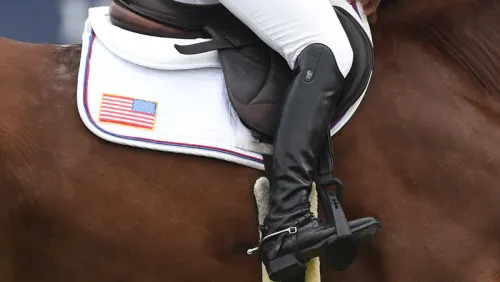The Tokyo Olympic and Paralympic Games were clean and drug-free, the Fédération Equestre Internationale announced Monday, saying it has received confirmation that all human and equine samples taken during the Games were returned negative of any prohibited substances.
“I am very proud to be able to confirm that, for the third Games in succession, all human and equine samples taken during the Tokyo Olympic and Paralympic Games have returned negative,” FEI President Ingmar De Vos said. “This should of course be business as usual, but it would be naïve to think that clean Games are guaranteed in any sport.”
Equine testing was conducted by the FEI under the FEI Equine Anti-Doping and Controlled Medication Regulations and FEI Veterinary Regulations. During the Olympic Games, 38 tests were carried out on 24 different horses, including all individual medalists and fourth-placed horses, plus at least one horse from medal-winning and fourth-placed teams. Random testing was also carried out, with horses selected by a random number generator app, and there was also targeted testing.
During the Paralympics, 38 tests were carried out on medal-winning horses, plus random and targeted testing.
Tokyo Olympic riders were tested by the International Testing Agency, an independent nonprofit anti-doping organization. The FEI has a long-term agreement with the ITA, and delegates parts of its human anti-doping program to the Agency, including testing coordination.
Rider testing at the Paralympic Games was conducted by Tokyo 2020 on behalf of the International Paralympic Committee.
ADVERTISEMENT
Following the same protocol as other Olympic sports, all samples will be kept for up to 10 years for potential retesting as improved testing techniques are developed.
“But, for now, this result validates all the work that has gone into the FEI Clean Sport educational campaign over the years, the buy-in of our National Federations and the uptake of equine pre-arrival testing and elective testing to ensure our horses would compete clean at the Games,” De Vos said.
The FEI’s Clean Sport campaign was started in 2010 as part of an ongoing educational outreach program to simplify the FEI anti-doping regulations, which are based on World Anti-Doping Authority principles.
The FEI now will turn its attention to lessons learned in Tokyo to apply to future Olympic and Paralympic Games.
“There is no doubt that, despite the challenges, our sport triumphed in Tokyo and we received lots of very positive feedback. But, as always, there are plenty of lessons learnt and key takeaways,” De Vos said. “There will be a full debrief, which will of course include a comprehensive review of the formats. Part of that process will be taking into account the feedback we have already received and we are also proactively reaching out to our community to ensure we get extensive input. And we will use the learnings from these Games to take forward to Paris 2024.”














